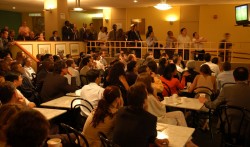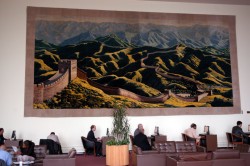Sat 1 Jul 2006
World Cup Diplomacy
Posted by Mary under New York, Oxfam
No Comments
 This morning I witnessed the gun lobby in action. It was finally time for the statements by non-governmental organizations. The back row of the room filled with American middle-aged white men, members of the National Rifle Association (NRA). It was quite a sight. One cautioned that regulating the global gun trade would inhibit sustainable development by curbing big game hunting tourism in southern Africa?!?
This morning I witnessed the gun lobby in action. It was finally time for the statements by non-governmental organizations. The back row of the room filled with American middle-aged white men, members of the National Rifle Association (NRA). It was quite a sight. One cautioned that regulating the global gun trade would inhibit sustainable development by curbing big game hunting tourism in southern Africa?!?
The real NGOs spoke next with 16 different statements. Unfortunately the morning session coincided with World Cup football and soon the room had emptied substantially as the diplomats watched Germany beat Argentina on penatlty shoot-outs in the cafe outside. Since we are on international territory at the United Nations, the diplomats can smoke in the café and corridors. Something you can no longer do indoors elsewhere in New York.
 I wound up spending much of the afternoon in the smoke-filled café watching another game and catching up with old friends. In the plenary room, the President had inexplicably scheduled a bizarre “case studies†session in which countries talked about their needs in the clean up of small arms and light weapons. With no outcome or meaning it was an odd session considering we have spent the past four days listening to very similar country statements.
I wound up spending much of the afternoon in the smoke-filled café watching another game and catching up with old friends. In the plenary room, the President had inexplicably scheduled a bizarre “case studies†session in which countries talked about their needs in the clean up of small arms and light weapons. With no outcome or meaning it was an odd session considering we have spent the past four days listening to very similar country statements.
I spent a lot of time trying to find out the buzz on the anticipated outcome of the conference, in particular where states are falling behind text recommending global guidelines on legitimate trade in small arms and light weapons. The guidelines would help provide some impetus to the call for an arms trade treaty, but several major powers are either lukewarm to the idea or downright hostile. We’ll know the outcome one week from now…








